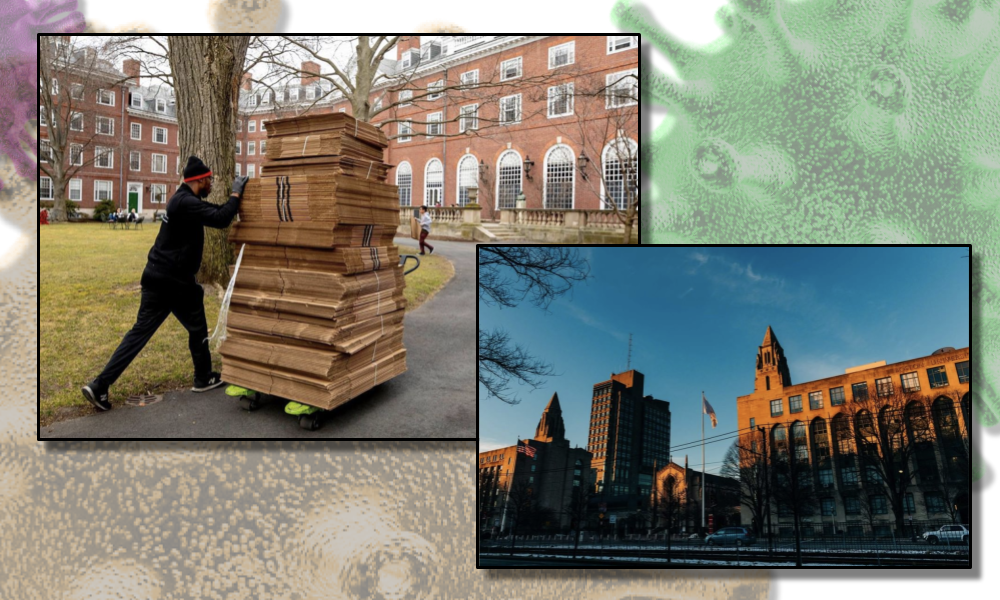From cases where landlords hiked the rental price of apartments and living spaces by 30 to 40% in less than a day, to violations of Boston’s five-or-more rule, problems persist.
On March 10, Governor Charlie Baker implemented a state of emergency in Massachusetts to give his administration more flexibility to respond to the COVID-19 outbreak. Pursuant to and immediately after Governor Baker’s announcement, all Massachusetts universities and colleges transitioned to remote learning and closed on-campus student housing facilities. While many colleges and universities publicly created on-line portals to review petitions to remain on-campus from those students in extreme need, tens of thousands are still struggling to find stable temporary housing in the Greater Boston area.
At the state and city levels, Governor Baker and Boston Mayor Marty Walsh’s offices have taken no steps to create emergency short-term housing options for students displaced by coronavirus. Rather, both are trusting colleges and universities to provide housing and resources, making for a situation in which students need to navigate a housing market known for shortages, overcrowding, and historical overcharging of students. In that sense, the coronavirus has effectively unveiled the lack of protection mechanisms in place, at the city and state government levels, to help vulnerable communities in crisis situations.
Governor Baker’s emergency declaration gave his office greater power to take actions like shutting down events with large gatherings of people, and to gain access to buildings or stockpile protective gear if needed without getting bogged down in existing paperwork requirements. In further attempts to curb the virus, last week Baker closed schools and banned gatherings of more than 25 people, while Mayor Walsh declared a public health emergency and announced the creation of a Boston Resiliency Fund to ensure access to food, provide technology for students at home, and arrange childcare for first responders who must continue to work.
None of these critical stipulations, however, address the housing crisis faced by Greater Boston-based college students who have been ordered to leave campus housing. The region is home to an estimated 225,000 students, of which about 75,000 students are international, low-income, and reside out-of-state (this number includes students who attend Brandeis and the University of Massachusetts system and does not include those at community colleges and language schools). Many of these students are still struggling to find temporary housing, and many are now technically homeless.
As of March 17, all Boston-area universities and colleges have instituted remote learning and closed student housing facilities, giving students anywhere from five to seven days to find alternative arrangements. Many school administrations set up public online portals to review petitions made by students with an extreme need to stay on campus, but students have complained that the decision process is not transparent. To make things worse, in addition to abruptly asking students to leave, universities have largely failed to create alternate living spaces or sought mechanisms for dispersing funds to students on scholarship to offset food and living expenses.
As such, tens of thousands of students will continue to face extreme challenges, some worse than others. While domestic students can still travel home, many international students face diverse scenarios: students from China, who comprise an estimated 33% of Boston’s international student population, cannot fly home, while European students are severely hampered by President Donald Trump’s order banning travel from European countries along with various international bans that are changing daily. Another potential risk is sending international students from Boston, a COVID-19 hot spot, back to countries where coronavirus has not yet emerged. Others may not have funds to pay for travel, lodging, and food.
In 2018, the Hope Center for College, Community, and Justice at Temple University in Philadelphia surveyed 86,000 students at 123 two- and four- year colleges. Researchers found that 56% of respondents were housing insecure in the previous year, while 45% were food insecure in the prior 30 days, and 17% reported being homeless. Furthermore, an estimated 48% of students attending Boston-based major universities and colleges are receiving some form of financial need-based scholarships that includes housing and a meal plan.
Before coronavirus, Boston was already experiencing an affordable housing shortage and students living in off-campus private residences were familiar with overcrowding and sky-high rents. According to the Fenway Community Development Corporation (CDC), it is normative practice for a landlord to overcrowd student apartments and not charge discounted rents. For instance, five students living in a three-bedroom apartment would each pay market-rate rent, while two slept in living rooms or common areas.
With the influx of tens of thousands of displaced students scrambling to find a place to live, the housing market has responded accordingly. This reporter found cases where landlords hiked the rental price of apartments and living spaces by 30 to 40% in less than a day. In addition, multiple violations of Boston’s five-or-more rule, which prohibits five or more people from sharing an apartment, were observed. The overcrowding ordinance was adopted in 2008 to stop landlords from creating unsafe and unhygienic apartments—violating it, like price-gouging, can trigger civil penalties. Another real and dangerous health concern is students living in overcrowded apartments in a city facing a pandemic.
In some ways, the Greater Boston community has responded to these needs. This reporter interviewed a number of potential landlords trying to rent spaces in their homes to students for below-rate rents, only to discover that they’re running into a problem: a January 1, 2019 law mandating short-term rentals, defined as 28 days or less, be appropriately registered.
According to the City of Boston, registration takes 21 days, and a space cannot be rented before approval is given. This ordinance was intended to “incorporate the growth of the home-share industry into the City’s work to create affordable housing for all residents,” meaning officials moved to regulate the Airbnb and short-term housing industry.
In response, would-be landlords are housing students free of charge, while others are accepting rental fees under the table. In other cases, groups or individuals are helping students buy flights home, store their belongings, and even with emotional and mental support.
The coronavirus pandemic poses a unique challenge for states and cities with homeless and displaced populations—unlike during or after a natural disaster, people can’t share mass living spaces. We reached out by phone and email to the offices of Governor Baker and Mayor Walsh to inquire about plans to either provide emergency housing for students impacted by the coronavirus or to expedite the creation of short-term rental housing units. Additional emails were sent to Walsh, asking about plans to use the Boston Resiliency Fund for such needs. On March 19, the City of Boston Inspectional Services Department responded, saying the city does not intend to alter the short-term rental ordinance. Instead, officials are in contact with area institutions, and feel confident that adequate steps are being taken by colleges and universities to provide necessary housing and support services to their communities.
In this crisis, Boston-based colleges and universities face a difficult decision—ask students to leave on-campus facilities, or create a potential health risk by housing students in close quarters. This reporter reached out to several Boston-based universities’ housing and government affairs offices to inquire about the decision-making process for providing housing to students. Representatives said that petitions were reviewed on a case-by-case basis, with priority given to the most extreme cases, such as international students who are unable to travel, as well as very low-income students. When asked about cases in which international and low-income students reported having to search for emergency housing, representatives had no comment.
The coronavirus pandemic has impacted millions around the world and derailed innumerable lives. Here, like in other cities, the most vulnerable will be hit the hardest. In Boston, the displaced student population is part of that demographic, comprising an estimated 75,000 international, low-income, and out-of-state individuals. While state officials have moved quickly to prevent the spread of COVID-19, they have not provided safe emergency short-term housing for students, or supersede legislation that prevents the expedited creation of additional units.
While coronavirus has highlighted cracks in the system, the situation presents a potential opportunity for improvement. According to Jason Desrosier, manager of community building and engagement at the Allston Brighton CDC, “This is a unique and unprecedented time. We need to take detailed notes to record all events for lessons learned, and to create new best practices to improve our institutions and regulations when this is over.”
Students in Boston and Cambridge with extreme need for housing, storage, and funds for flights can contact the Cambridge Neighborhood Aid Network.









